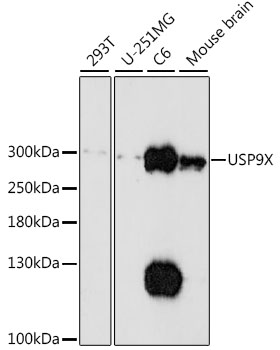-
Product Name
USP9X Polyclonal Antibody
- Documents
-
Description
Polyclonal antibody to USP9X
-
Tested applications
WB
-
Species reactivity
Human, Mouse, Rat
-
Alternative names
USP9X antibody; DFFRX antibody; FAF antibody; FAM antibody; MRX99 antibody; MRXS99F antibody; ubiquitin specific peptidase 9, X-linked antibody
-
Isotype
Rabbit IgG
-
Preparation
Antigen: A synthetic peptide of human USP9X
-
Clonality
Polyclonal
-
Formulation
PBS with 0.02% sodium azide, 50% glycerol, pH7.3.
-
Storage instructions
Store at -20℃. Avoid freeze / thaw cycles.
-
Applications
WB 1:500 - 1:2000
-
Validations

Western blot - USP9X Polyclonal Antibody
Western blot analysis of extracts of various cell lines, using USP9X antibody at 1:1000 dilution.Secondary antibody: HRP Goat Anti-Rabbit IgG (H+L) at 1:10000 dilution.Lysates/proteins: 25ug per lane.Blocking buffer: 3% nonfat dry milk in TBST.Detection: ECL Enhanced Kit .Exposure time: 120s.
-
Background
Deubiquitinase involved both in the processing of ubiquitin precursors and of ubiquitinated proteins. May therefore play an important regulatory role at the level of protein turnover by preventing degradation of proteins through the removal of conjugated ubiquitin. Specifically hydrolyzes 'Lys-48'-, 'Lys-29'- and 'Lys-33'-linked polyubiquitins chains. Essential component of TGF-beta/BMP signaling cascade. Specifically deubiquitinates monoubiquitinated SMAD4, opposing the activity of E3 ubiquitin-protein ligase TRIM33. Deubiquitinates alkylation repair enzyme ALKBH3. OTUD4 recruits USP7 and USP9X to stabilize ALKBH3, thereby promoting the repair of alkylated DNA lesions. Regulates chromosome alignment and segregation in mitosis by regulating the localization of BIRC5/survivin to mitotic centromeres. Involved in axonal growth and neuronal cell migration. Regulates cellular clock function by enhancing the protein stability and transcriptional activity of the core circadian protein ARNTL/BMAL1 via its deubiquitinating activity.
Related Products / Services
Please note: All products are "FOR RESEARCH USE ONLY AND ARE NOT INTENDED FOR DIAGNOSTIC OR THERAPEUTIC USE"
